As New York’s Tribeca Film Festival ceded its traditional springtime slot for a decidedly more summery one this June, it will coincide with Pride month — when just about everything in New York gets a little more gay. With queer audiences excited to be together again and looking for events to feel proud of, the festival’s new time could be just the thing to kick off the celebratory month. Between TV pilots and in-person talks from beloved gay comedians John Early and Tig Notaro and the premieres of independent queer films from around the world, Tribeca’s robust slate of LGBTQ programming has something for every cultural palate.
“When I joined the team, it was [with] the intention of making sure the festival made space for queer representation, and making sure that their stories were not limited to queer bubbles, that they were being appreciated my mainstream audiences as well,” said Tribeca senior programmer Lucy Mukerjee. “There is still a lack of support in the industry for our stories, but it makes it even more triumphant when we do find really impressive pieces of cinema. It makes it all the more sweeter. I think making films as a queer filmmaker is very much a radical act. Inviting audiences into our experience still feels like a form of activism.”
While overall submissions were up this year, Mukerjee said two-and-a-half years of the pandemic put more strain on queer filmmakers — who already face more obstacles to getting work made. But despite industry-wide challenges of the pandemic, queer filmmakers still found a way to tell their stories.
Here are some of the most exciting LGBTQ films playing this year’s Tribeca Film Festival. The festival runs June 8 – 19, and tickets for all events are now on sale. For those looking to attend virtually, the Tribeca At Home platform offers robust programming June 9 – 26, with more information available right here.
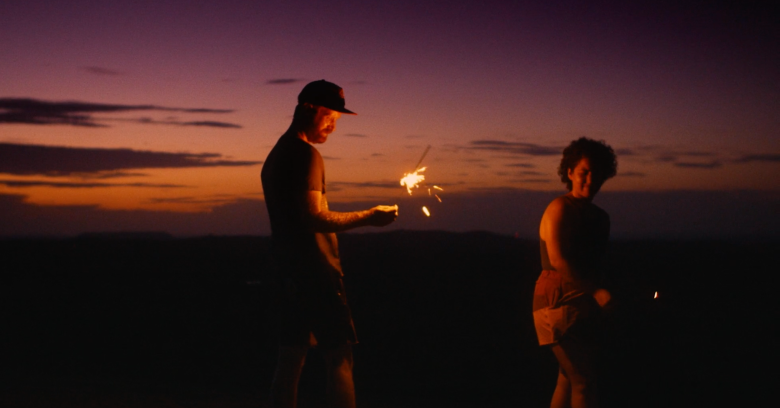
“Three Headed Beast”
Tribeca
Austin-based co-directors Fernando Andrés and Tyler Rugh make their feature debut with an lyrical erotic drama about the various entanglements behind one open relationship. Shot and set in their hometown, the film doesn’t over-explain the details of unconventional relationship structures, presenting the film’s various intimacies with a straightforward perspective. This sophisticated sensibility extends to the visual storytelling as well, which grounds its more experimental cinematic choices with naturalistic performances. The 24-year-old directing duo wore many hats for their debut, with Andrés editing and lensing the film.
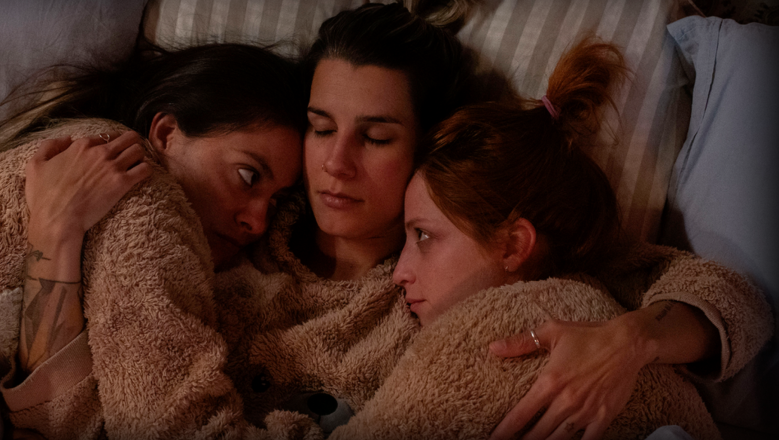
“Petit Mal”
Tribeca
Yet another polyamorous romance proves that queer filmmaking has only begun to scratch the surface of alternative sexualities. Colombian filmmaker Ruth Caudeli (“Eva + Candela”) stars in her third feature film, which she also wrote and co-edited. The film follows a passionate, loving, and playful throuple, played by Caudeli and co-stars Silvia Varón and Ana María Otálora. Their life of backyard barbecues and cuddle piles is unexpectedly reshaped when one of them takes a job away from home, leaving the trio out of balance and surprisingly off-kilter. Blending documentary and semi-autobiographical fiction, the film is an intimate portrait of a unique connection between women.
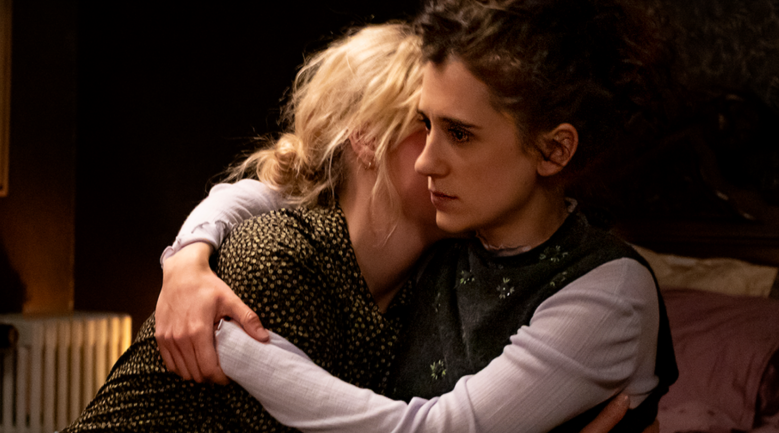
“Attachment”
Tribeca
The experimental Midnight sections are often where festivals can be more daring in their programming, and this year’s Tribeca is no exception. Offering one of the most unlikely melange of intriguing subjects that includes Jewish folklore, London’s Hasidic community, and a possession thriller, this Danish horror romance blends comedy, genre, and mystery as only the Scandinavians could. The film follows a whirlwind romance between a former child actress and a Jewish academic, which leads to a mysterious community haunted by inherited trauma. Using the possession thriller as an allegory for lesbian codependency, the ominously-titled “Attachment” mines our deepest fears around intimacy for delicious scares.
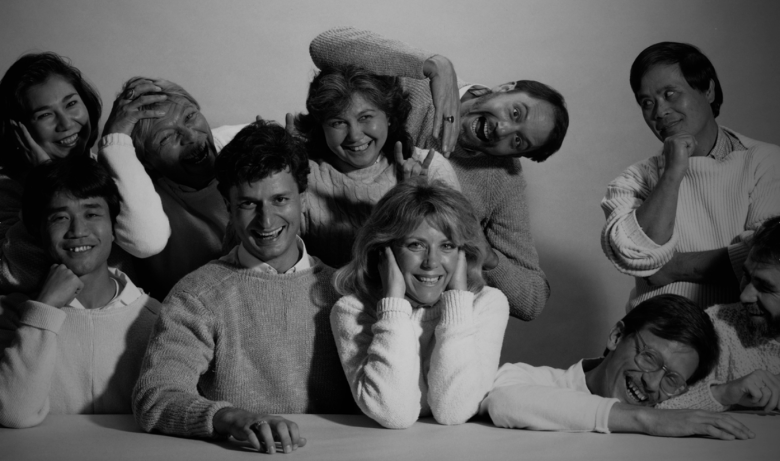
“All Man: The International Male Story”
Tribeca
It wouldn’t be Tribeca without a few entertaining documentary premieres. The festival that debuted Rachel Mason’s raucous and touching “Circus of Books” in 2019 seeks to catch lightning in a bottle again with a celebratory exploration of gay male fashion’s silliest as-yet-untold story. Narrated by Matt Bomer and featuring an engaging array of celebrity stylists and designers, the documentary chronicles the rise and fall of the International Male catalog, a garish ’80s fashion mag beloved by gay teens for its over-the-top designs and revealing model shots. While directors Bryan Darling and Jesse Reed take a tongue-in-cheek approach to their subject matter, they frame the frivolity through the lens of the AIDS crisis and American masculinity, placing the playful subject alongside its cultural significance.
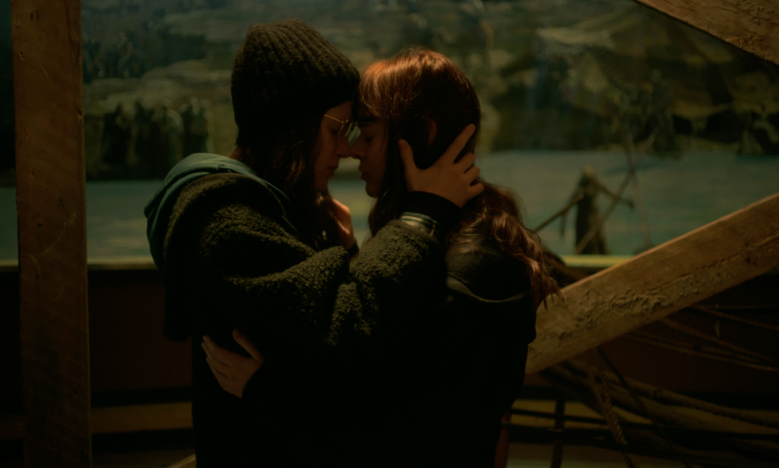
“You Can Live Forever”
Tribeca
Set during the nostalgic period du jour of the early 1990s, the debut feature from Montreal filmmakers Sarah Watts and Mark Slutsky follows a queer teenager who is sent to live with her devout Jehovah’s Witness relatives after the death of her father. Finding herself unexpectedly drawn to the daughter of a prominent Witness elder, the two embark on a secret relationship. When the community finds out they are forced to separate, forcing the characters on a path of self-acceptance.
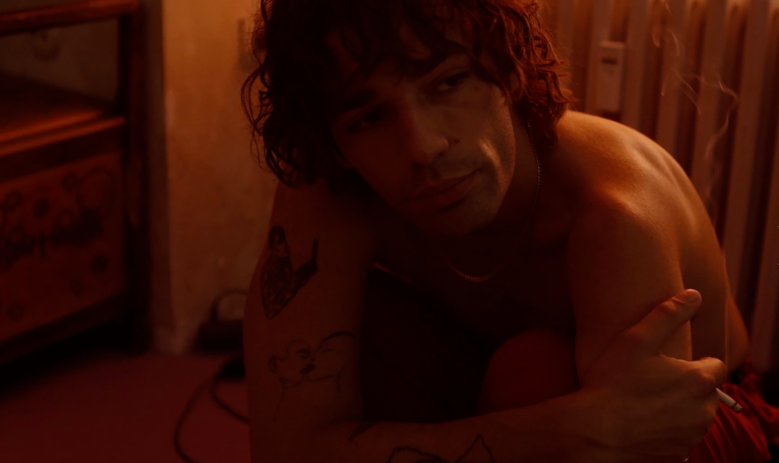
“Lucky”
Tribeca
Set between Paris and Berlin, where 27-year-old Luc Bruyère finds his trade as a model, musician, dancer, and drag queen, “Lucky” is an evocative portrait of a life lived without fear. Having lost is left arm in birth and with an HIV positive status, Bruyère wields his magnetic charm and physical beauty like a force for good, thoughtfully navigating life with a disability and complicated relationships with his family. The debut film from Loren Denis and Anthony Vibert is an intimate and visceral portrait of resilience, gender fluidity, sex work, and addiction, while also normalizing life with HIV.
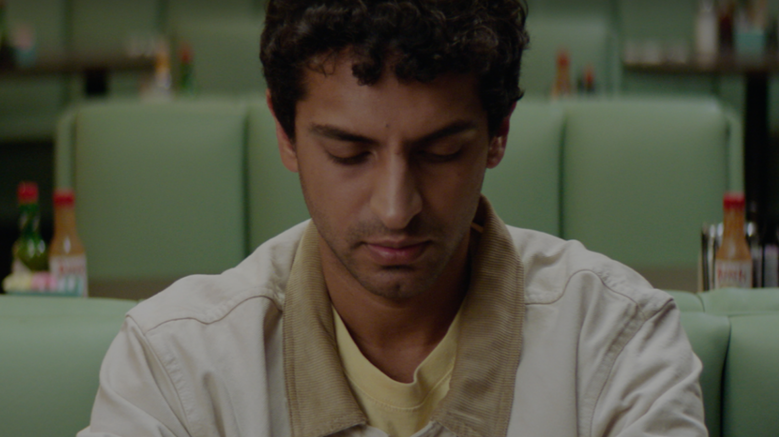
“Coming Out with the Help of a Time Machine”
Tribeca
Best known for his turn in the “Deadpool” movies, Karan Soni is a prolific comedic character actor who has been slowly charting a course as an unconventional leading man in small independent films. Earlier this year, he starred opposite Geraldine Viswanathan in the charming Indie Spirit winner “7 Days,” which he co-wrote with his partner Roshan Sethi. Most of his “Deadpool” and “Miracle Workers” fans may not realize he’s gay, but Soni has never made his sexuality a secret. Here he stars in a sci-fi comedy short from director Naman Gupta, as a man who uses a time machine to come out to his traditional Indian parents.
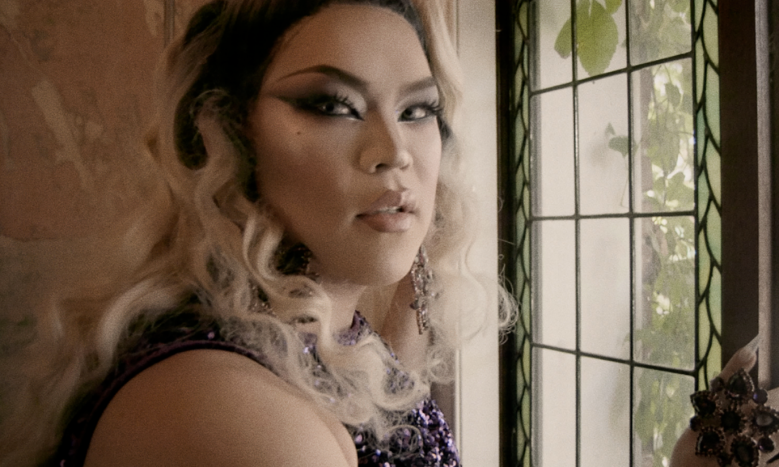
“The House of Labeija”
Tribeca
There’s no denying that queer cinema would not be the same without “Paris Is Burning,” but Jennie Livingston’s groundbreaking 1990 documentary is no longer the only cinematic archive of New York’s legendary ballroom community. Directed by Fredgy Noël, this short documentary features members of the prominent ballroom family, the House of LaBeija, which is the first ballroom house in New York City — established in 1972 by Crystal LaBeija. The film pays homage to the House of LaBeija through a series of letters from current members. It also features original music composed by Khalif Diouf, formerly known as Le1F.
“When I joined the team, it was [with] the intention of making sure the festival made space for queer representation, and making sure that their stories were not limited to queer bubbles, that they were being appreciated my mainstream audiences as well,” said Tribeca senior programmer Lucy Mukerjee. “There is still a lack of support in the industry for our stories, but it makes it even more triumphant when we do find really impressive pieces of cinema. It makes it all the more sweeter. I think making films as a queer filmmaker is very much a radical act. Inviting audiences into our experience still feels like a form of activism.”
While overall submissions were up this year, Mukerjee said two-and-a-half years of the pandemic put more strain on queer filmmakers — who already face more obstacles to getting work made. But despite industry-wide challenges of the pandemic, queer filmmakers still found a way to tell their stories.
Here are some of the most exciting LGBTQ films playing this year’s Tribeca Film Festival. The festival runs June 8 – 19, and tickets for all events are now on sale. For those looking to attend virtually, the Tribeca At Home platform offers robust programming June 9 – 26, with more information available right here.
“Three Headed Beast”

“Three Headed Beast”
Tribeca
Austin-based co-directors Fernando Andrés and Tyler Rugh make their feature debut with an lyrical erotic drama about the various entanglements behind one open relationship. Shot and set in their hometown, the film doesn’t over-explain the details of unconventional relationship structures, presenting the film’s various intimacies with a straightforward perspective. This sophisticated sensibility extends to the visual storytelling as well, which grounds its more experimental cinematic choices with naturalistic performances. The 24-year-old directing duo wore many hats for their debut, with Andrés editing and lensing the film.
“Petit Mal”

“Petit Mal”
Tribeca
Yet another polyamorous romance proves that queer filmmaking has only begun to scratch the surface of alternative sexualities. Colombian filmmaker Ruth Caudeli (“Eva + Candela”) stars in her third feature film, which she also wrote and co-edited. The film follows a passionate, loving, and playful throuple, played by Caudeli and co-stars Silvia Varón and Ana María Otálora. Their life of backyard barbecues and cuddle piles is unexpectedly reshaped when one of them takes a job away from home, leaving the trio out of balance and surprisingly off-kilter. Blending documentary and semi-autobiographical fiction, the film is an intimate portrait of a unique connection between women.
“Attachment”

“Attachment”
Tribeca
The experimental Midnight sections are often where festivals can be more daring in their programming, and this year’s Tribeca is no exception. Offering one of the most unlikely melange of intriguing subjects that includes Jewish folklore, London’s Hasidic community, and a possession thriller, this Danish horror romance blends comedy, genre, and mystery as only the Scandinavians could. The film follows a whirlwind romance between a former child actress and a Jewish academic, which leads to a mysterious community haunted by inherited trauma. Using the possession thriller as an allegory for lesbian codependency, the ominously-titled “Attachment” mines our deepest fears around intimacy for delicious scares.
“All Man: The International Male Story”

“All Man: The International Male Story”
Tribeca
It wouldn’t be Tribeca without a few entertaining documentary premieres. The festival that debuted Rachel Mason’s raucous and touching “Circus of Books” in 2019 seeks to catch lightning in a bottle again with a celebratory exploration of gay male fashion’s silliest as-yet-untold story. Narrated by Matt Bomer and featuring an engaging array of celebrity stylists and designers, the documentary chronicles the rise and fall of the International Male catalog, a garish ’80s fashion mag beloved by gay teens for its over-the-top designs and revealing model shots. While directors Bryan Darling and Jesse Reed take a tongue-in-cheek approach to their subject matter, they frame the frivolity through the lens of the AIDS crisis and American masculinity, placing the playful subject alongside its cultural significance.
“You Can Live Forever”

“You Can Live Forever”
Tribeca
Set during the nostalgic period du jour of the early 1990s, the debut feature from Montreal filmmakers Sarah Watts and Mark Slutsky follows a queer teenager who is sent to live with her devout Jehovah’s Witness relatives after the death of her father. Finding herself unexpectedly drawn to the daughter of a prominent Witness elder, the two embark on a secret relationship. When the community finds out they are forced to separate, forcing the characters on a path of self-acceptance.
“Lucky”

“Lucky”
Tribeca
Set between Paris and Berlin, where 27-year-old Luc Bruyère finds his trade as a model, musician, dancer, and drag queen, “Lucky” is an evocative portrait of a life lived without fear. Having lost is left arm in birth and with an HIV positive status, Bruyère wields his magnetic charm and physical beauty like a force for good, thoughtfully navigating life with a disability and complicated relationships with his family. The debut film from Loren Denis and Anthony Vibert is an intimate and visceral portrait of resilience, gender fluidity, sex work, and addiction, while also normalizing life with HIV.
“Coming Out with the Help of a Time Machine”

“Coming Out with the Help of a Time Machine”
Tribeca
Best known for his turn in the “Deadpool” movies, Karan Soni is a prolific comedic character actor who has been slowly charting a course as an unconventional leading man in small independent films. Earlier this year, he starred opposite Geraldine Viswanathan in the charming Indie Spirit winner “7 Days,” which he co-wrote with his partner Roshan Sethi. Most of his “Deadpool” and “Miracle Workers” fans may not realize he’s gay, but Soni has never made his sexuality a secret. Here he stars in a sci-fi comedy short from director Naman Gupta, as a man who uses a time machine to come out to his traditional Indian parents.
“The House of Labeija”

“The House of Labeija”
Tribeca
There’s no denying that queer cinema would not be the same without “Paris Is Burning,” but Jennie Livingston’s groundbreaking 1990 documentary is no longer the only cinematic archive of New York’s legendary ballroom community. Directed by Fredgy Noël, this short documentary features members of the prominent ballroom family, the House of LaBeija, which is the first ballroom house in New York City — established in 1972 by Crystal LaBeija. The film pays homage to the House of LaBeija through a series of letters from current members. It also features original music composed by Khalif Diouf, formerly known as Le1F.


